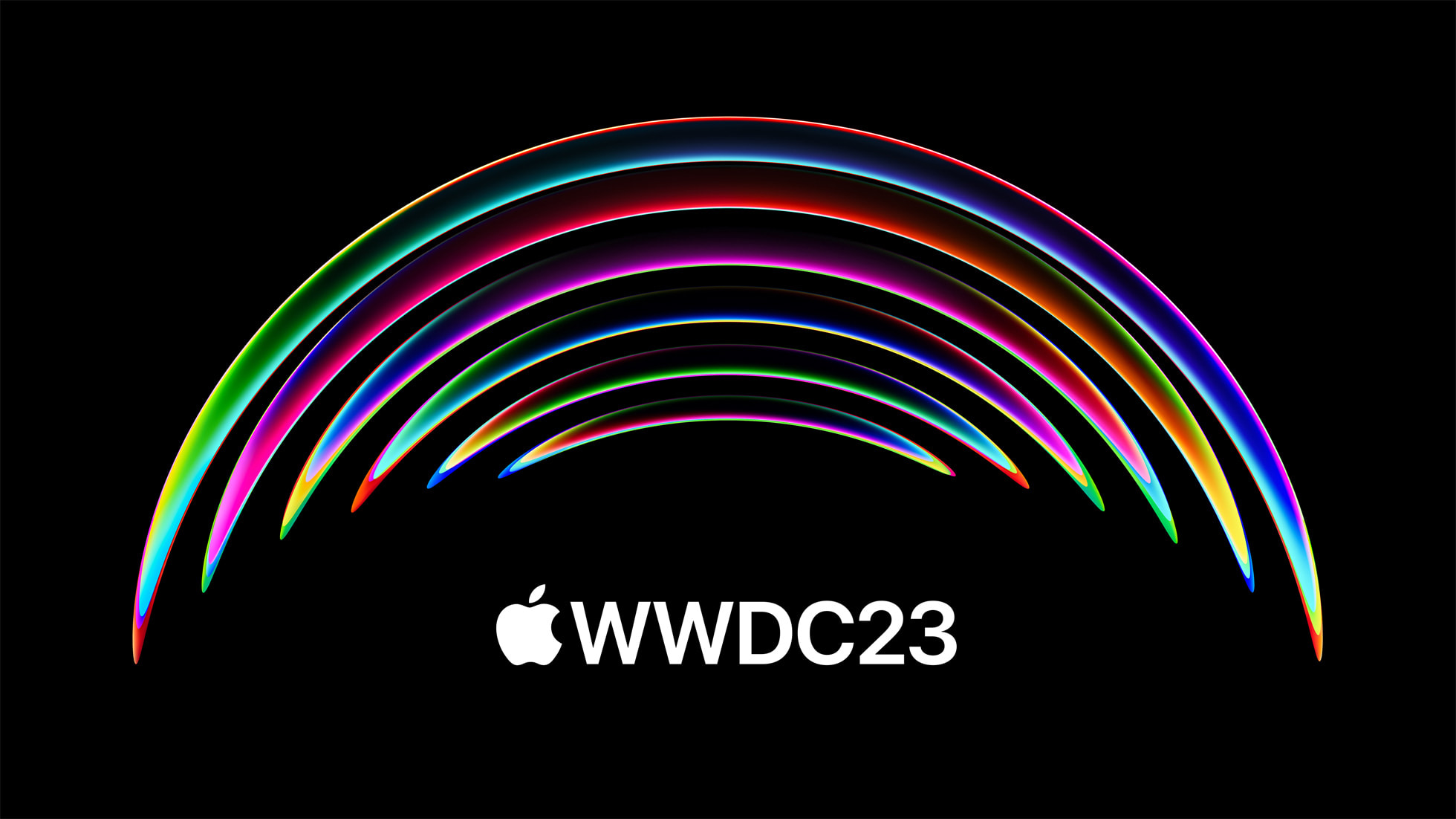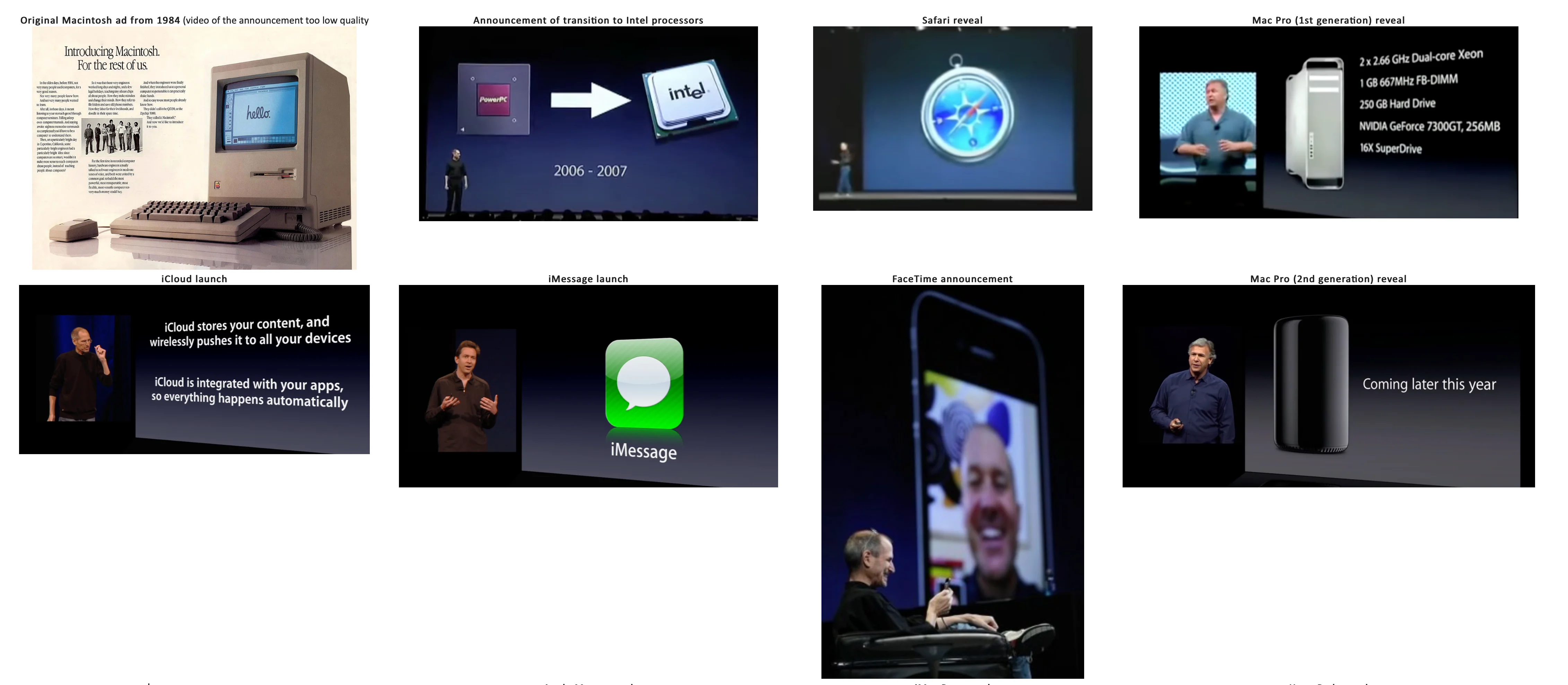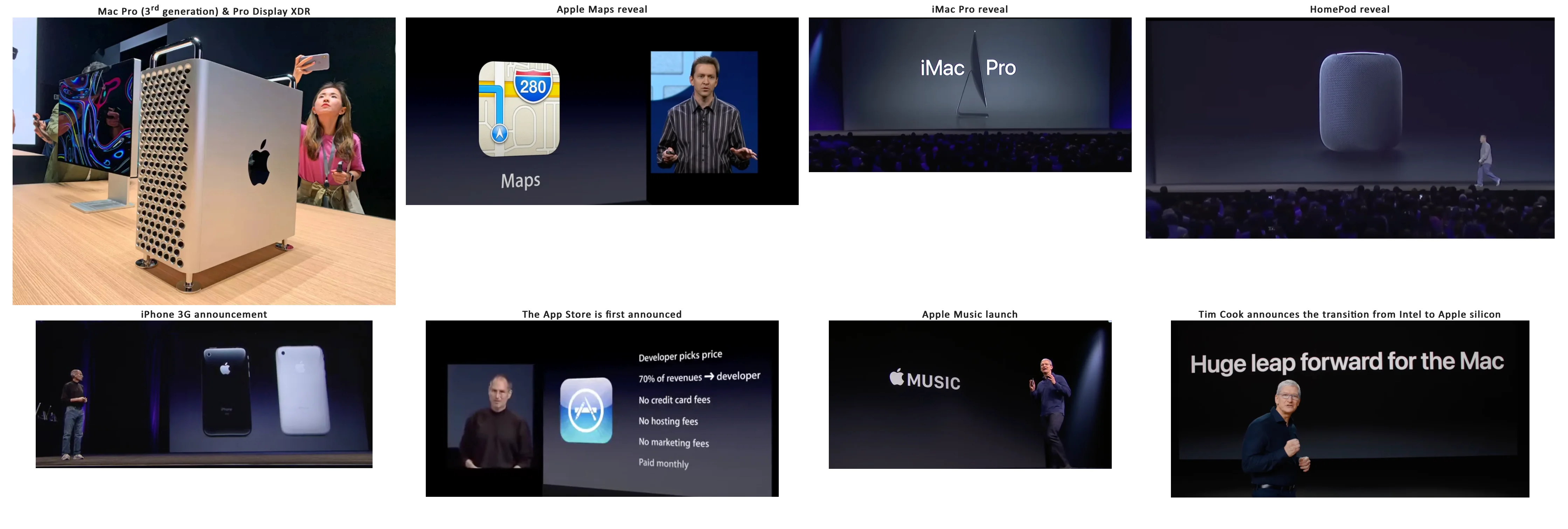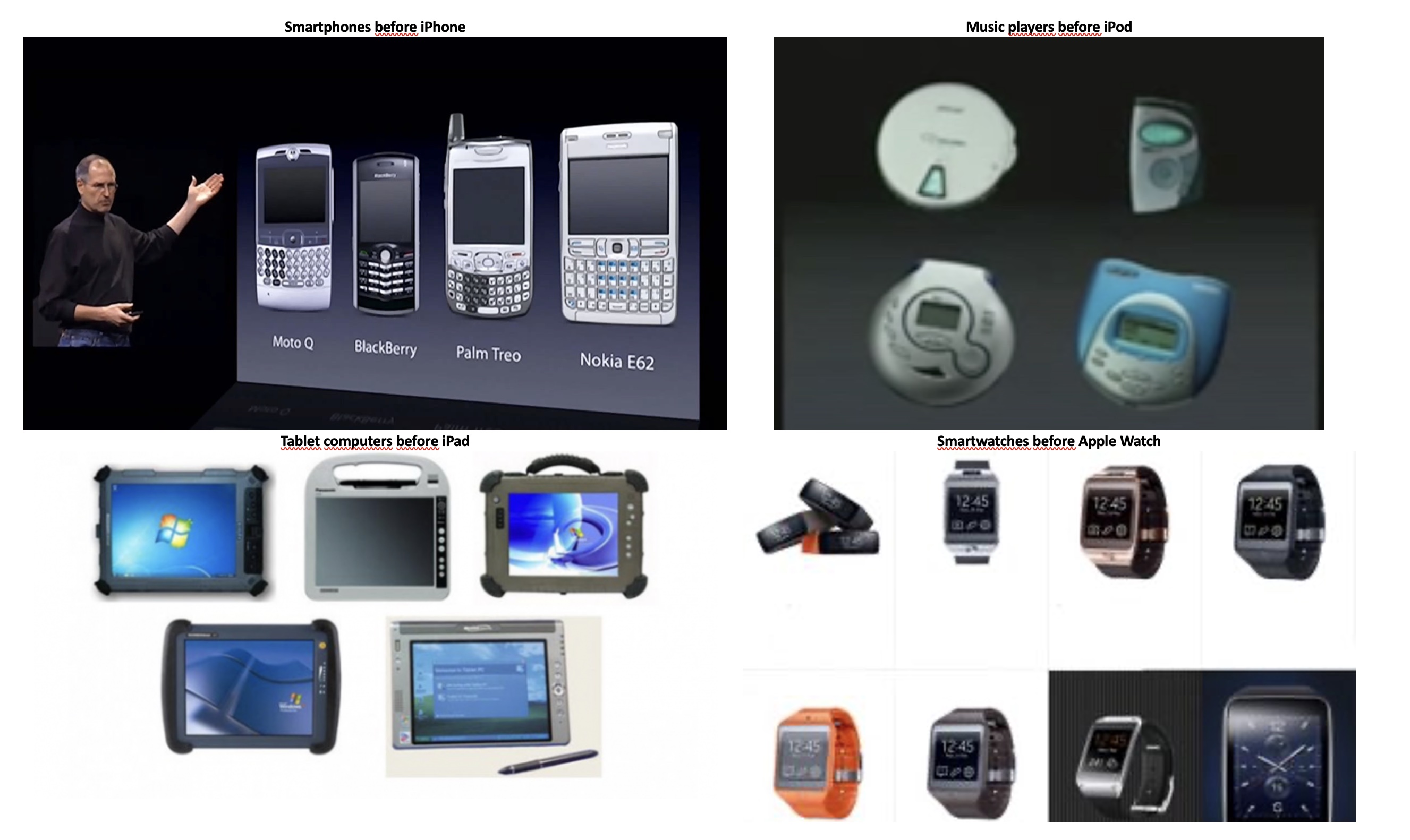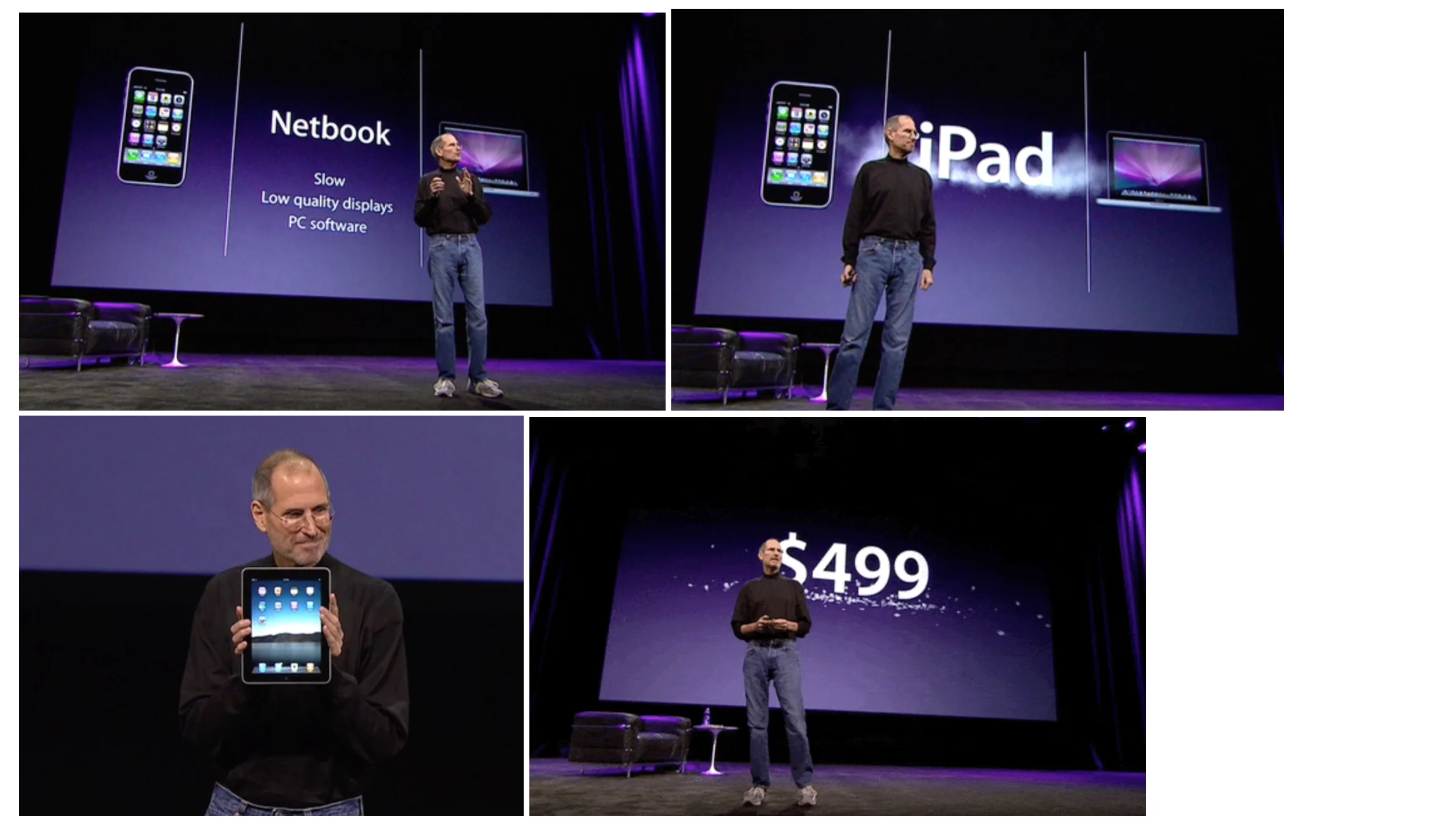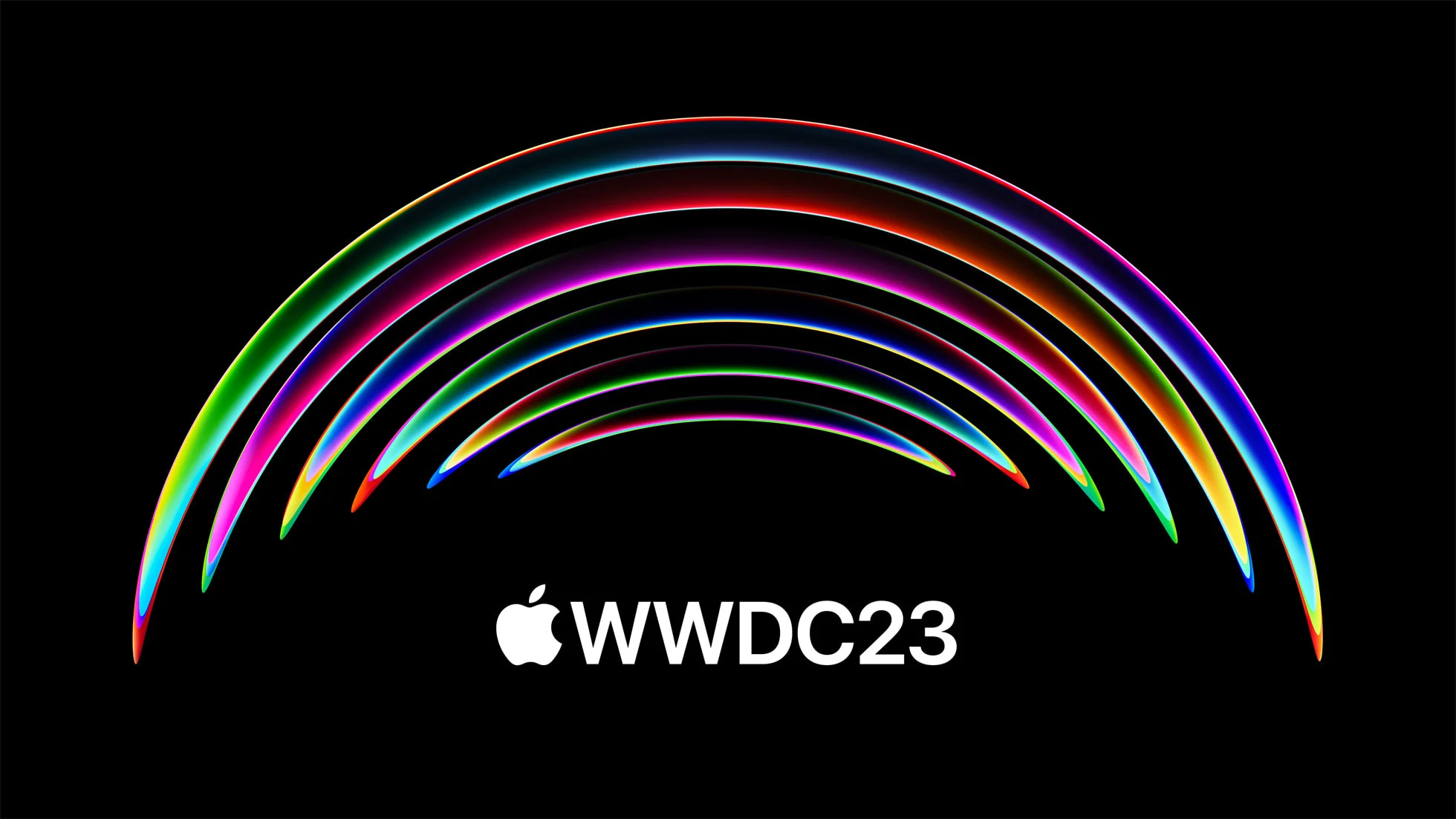Table of Contents
Looking back before looking ahead
In just two weeks, Apple kicks off WWDC23 which is their WorldWide Developer Conference, held annually since 1983.
The event will start with an event for the public on June 5 at 10AM Pacific (19:00 CET).
It’s widely expected that this will be one of Apple’s most important events in quite some time - because it’s expected to feature the first new product category introduction since the Apple Watch in 2014.
But before we look ahead, I think it would be prudent to stop and retrospect on similar events in Apple’s past - which hasn’t happened all that often. And before we do that, let’s review what even is WWDC?
What is WWDC?
WWDC is the World Wide Developer Conference that Apple have been arranging annually since 1983. It spans across a full week and is usually held in the beginning of June. The conference is primarily aimed at developers (individuals, small and large companies who make software and hardware that runs or works on/with Apple’s products) for the majority of the week, but the HUGE exception is the kick-off which is a keynote event intended for the general public (Apple customers worldwide and anybody with a tech interest) as well as the media, and this keynote is, honest-to-god, watched by tens of million people worldwide (in 2020, it was confirmed over 25 million people watched live – and on top of that a lot more people watch after the fact the recorded version).
The WWDC keynote is where Apple reveal what is next for all their major software platforms in the coming year – i.e. WWDC is where Apple announce new versions of iOS, macOS, iPadOS, watchOS, tvOS, and so on – and what these new versions will feature. That is common for every year. Unique this year though, is that Apple is rumoured to launch the first new product category since the Apple Watch was introduced in 2014.
Read up on the highlights from last year’s WWDC, which will help you understand what WWDC is all about. These were the main announcements made in last year’s WWDC:
- iOS 16: New ways to share and communicate
- iPadOS 16: Takes the versatility of iPad even further
- M2: Breakthrough performance and capabilities
- watchOS 9: Delivers new ways to stay connected, active, and healthy
- macOS Ventura: Adds powerful productivity tools, new Continuity features to Mac
- MacBook Air: All-new, supercharged by the new M2 chip
- Apple provides developers with even more powerful technologies
If you want, you can even watch the last event, just parts or the whole thing, to get an even better sense on what to expect.
Historical WWDC Announcements
As mentioned, standard is that WWDC is where Apple reveals everything that is next for their major software platforms - i.e. WWDC is where they announce new versions of iOS, macOS, iPadOS, watchOS, tvOS and so on. That is common for every year. But sometimes, Apple uses the WWDC keynote to announce something completely different. Below are some examples from history. The links lead to the press release as well as the announcement video, respectively.
- Original Macintosh (1984)
- More details below
- QuickTime (1991)
- Safari (2003)
- Transition to Intel processors (2005)
- 18 years later, Apple would transition away from Intel to their own processors in 2020 – much for the same reason for the 2005 switch to Intel from PowerPC: Intel at the time made faster and more power efficient chips. In 2020, Apple could make them faster and much more power-efficient themselves
- First Mac Pro (2006)
- iPhone 3G (the 2nd ever iPhone) (2008) (video)
- The App Store (2008) (video)
- Hard to believe today, but the iPhone did not ship with the App Store, the concept didn’t even exist. It came over a year later.
- iPhone 4 (2010) (video)
- FaceTime (2010) (video)
- iCloud (2011) (video)
- iMessage (2011) (video)
- Today, it is estimated that 50 billion iMessages are sent every day between Apple users
- Apple Maps (2012) (video)
- While a troubled launch at the time, now as a much heralded feature
- Mac Pro (2013) (video)
- Apple Music (2015) (video)
- iMac Pro (2017) (video)
- Original HomePod (2017) (video)
- Mac Pro & Pro Display XDR (2019) (video)
- Mac transition from Intel to Apple silicon (2020) (video)
With regards to “Firsts”
- Before the Macintosh, there were other personal computers but the Macintosh made them popular for real since it introduced the graphical user interface
- Before the iPod, there were other mp3 players, but they were clunky. iPod made the category extremely mainstream, and was the start of sending Apple into the stratosphere in terms of success
- iPod was discontinued after lasting for 20 years, in 2022 – generating over half a billion unit sales during its lifetime
- Before the iPhone, there were other smartphones, but they were not of interest to the general public and mostly businesses were purchasing (at small volumes) - the iPhone changed everything
- iPhones are selling at 250 million devices per year and continues to capture the lions share of the revenue market share
- Before the iPad, there were other tablet-style products, but iPad took over the market very quickly and to this day holds a very large portion of the market with Android tablets few and far between
- Before AirPods, there were attempts at true wireless earbuds – but Apple turned the wireless audio segment on its head with the introduction of the AirPods. The AirPods had a similar design aesthetic to the EarPods, but the lack of any wires made them much more enticing. But what truly set them apart was the ease of use; thanks to a dedicated W1 Bluetooth chip, they paired seamlessly with iPhones, iPads, and MacBooks in a matter of seconds, and once paired, they stayed connected.
- Before the Apple Watch, there were other smartwatches (Samsung even made it a point to immediately schedule the reveal of their first smartwatch just before Apple’s event as soon as it was announced…)
All this to say: Apple is very rarely “first” with anything. That has always been true, and it has never posed a problem for Apple in the past – hence there should be no reason to believe anything different in the future.
What Apple does well is take an existing emerging product category, and take in mainstream in the uniquely Apple way of building a product customers actually want.
With regards to ”Flops”
Without exception, anytime Apple introduces a new product and especially when they launch a new product category the pundits react with cynicism and massive skepticism, and the internet fills up quickly with hot takes on how the latest Apple product is a massive failure and will flop.
So far, those hot takes have turned out to be wrong.
Below you will find an list of example quotes of various reactions to Apple’s new products. You can see for yourself if you think they’ve aged poorly or not. And these quotes are only scratching the surface, you canvisit places like “iPad Death Watch” (ironically named) for many, many, many more examples like this, including for basically every Apple products or service that I am not covering here.
Macintosh
- ”The Macintosh uses an experimental pointing device called a “mouse”. There is no evidence that people want to use these things.” San Francisco Examiner, John C. Dvorak, 19 Feb. 1984
- “Anybody who could write a good application on a 128K Mac deserves a medal.” – Bill Gates, 1984
iPod
- “Is there a toaster that also knows how to brew coffee? There is no such combined device, because it would not make anything better than an individual toaster or coffee machine. It works the same way with the iPod, the digital camera or mobile phone: it is important to have specialized devices.~ Jon Rubenstein (Palm)*
- “I think the iPod will be another one of Apple’s failures just like the Newton. It’s only for the Mac; not a lot of the MP3 world uses Macs, compared with PCs. It costs $400; you can get so many other players that work well for much less. Apple could have done more-innovative things with an MP3 player than just make it look cool and give it some fast features.”— April 2002 issue of Macworld
- ”One of the “Top Five Worst Tech Gifts” to get for Christmas in 2001”.—TechTarget
- “No wireless. Less space than a Nomad. Lame.”— Slashdot
iPhone
- ”The iPhone is a sustaining technology relative to Nokia. In other words, Apple is leaping ahead on the sustaining curve by building a better phone. But the prediction of the theory would be that Apple won’t succeed with the iPhone. They’ve launched an innovation that the existing players in the industry are heavily motivated to beat: It’s not truly disruptive. History speaks pretty loudly on that, that the probability of success is going to be limited”.~ Clayton Christensen, Author of Innovator’s Dilemma, 28 June 2007
- ”We’ve learned and struggled for a few years here figuring out how to make a decent phone. PC guys are not going to just figure this out. They’re not going to just walk in.~ Palm CEO Ed Colligan”
- “In our view, the appearance of the iPhone poses little risk to RIM’s business.~ Chris Umiastowski, TD Securities
- “I am not sure how the iPhone will stand against Sprint’s Wimax (when it successfully launches) and its phones, which I am looking forward much more than over-hyped Apple iPhone.~ Bhaskar Chitraju, Indews Broadcast
- “The big competitors in the mobile-phone industry such as Nokia Oyj and Motorola Inc. won’t be whispering nervously into their clamshells over a new threat to their business. The iPhone is nothing more than a luxury bauble that will appeal to a few gadget freaks.~ Matthew Lynn, Bloomberg
- “The honeymoon is over for the iPhone.~ Tim Moynihan, Crave, the Gadget Blog from Cnet 11 January 2007
- “Apple should pull the plug on the iPhone”…~ John C. Dvorak, 28 March 2007
- “We Predict the iPhone will bomb”~ Porges, The Futurist, 7 June 2007
- “I’m more convinced than ever that, after an initial frenzy of publicity and sales to early adopters, iPhone sales will be unspectacular… iPhone may well become Apple’s next Newton.~ David Haskin, Computerworld, 26 February 2007
- “Apple begins selling its revolutionary iPhone this summer and it will mark the end of the string of hits for the company.”~ Todd Sullivan, Seeking Alpha, 15 May 2007
- “The honeymoon is over for the iPhone.~ Tim Moynihan, Crave, the Gadget Blog from Cnet 11 January 2007
- “What we see is that youth are pretty much fed up with iPhones. Everyone has the iPhone.~ Niels Munksgaard, Director of Portfolio, Product Marketing & Sales , Nokia, 13 Dec 2011
- “The decline of the iPhone has started. And that will become clear long before the year 2010 is gone…~ Tomi T Ahonen, Former Nokia Executive, Inc, 9 April 2010
- “Let’s face it, the Internet was designed for the PC. The Internet is not designed for the iPhone.”~ Steve Ballmer, Microsoft, 21 October 2009
- “Once the initial fever wears off, however, the bloom will really be off the rose, and sales will be disappointing”~ Jim Louderback, PC Magazine. 6 June 2007
- “The iPhone will not substantially alter the fundamental structure and challenges of the mobile industry.~ Charles Golvin, Forrester Research Inc, January 2007
- “The iPhone’s willful disregard of the global handset market will come back to haunt Apple.~ Tero Kuittinen, RealMoney.com, 18 January 2007
- “In our view, the appearance of the iPhone (or something like it) poses little risk to RIM’s (Blackberry) business.~ Chris Umiastowski, TD Securities, 12 December 2006
- “The iconic Apple iPhone will either not exist or occupy a very small niche satisfying the needs of committed Mac fans around five years from now.” – Eugene Kaspersky
- “The forthcoming (June 29) release of the Apple iPhone is going to be a bigger marketing flop than Ishtar and Waterworld combined.~ David S. Platt, Suckbusters!, 21 June 2007
- “What does the iPhone offer that other cell phones do not already offer, or will offer soon? The answer is not very much…~ Laura Goldman, LSG Capital, 21 May 2007
- “The big competitors in the mobile-phone industry such as Nokia Oyj and Motorola Inc. won’t be whispering nervously into their clamshells over a new threat to their business. The iPhone is nothing more than a luxury bauble that will appeal to a few gadget freaks.~ Matthew Lynn, Bloomberg, 15 January 2007
- “Siri could signal the beginning of the end for Apple.~ Greg Satell, Forbes, 26 March 2013
- “Apple’s iOS 7 launch is fast becoming its most troubled mobile operating system update, increasing concern that the technology giant has lost some of its magic touch since co-founder Steve Jobs passed away two years ago.”~ Scott Martin and Alistair Barr, USA Today, 17 October 2013
iPad
- “The iPad will remain an expensive, niche device compared to all-purpose netbooks…. (N)etbooks sales will still far outstrip those of the iPad."~ Preston Gralla, PC World, 2010
- “The tablet market has only succeeded as a niche market over the years and it was hoped Apple would dream up some new paradigm to change all that. From what I’ve seen and heard, this won’t be it."~ John C. Dvorak, MarketWatch, 29 January 2010
- “I added it up and … like 800 people are going to buy the iPad."~ Molly Wood, CNet, 31 January 2010
- “If Apple makes a successful tablet, they will have accomplished what no other company before them has ever managed to do, which is why I am not optimistic. If I turn out to be wrong, I’ll gladly eat my words, but I’m pretty sure that I’m not wrong."~ Alex Cook, Frontier Outlook, 28 January 2010
- “Unless Apple has also developed some new type of power source, such as nuclear cells or magical hamsters on tiny spinning wheels for the iPad, don’t expect the claims about battery life to hold true."~ John Breeden II, Government Computer News, 28 January 2010
- “The Apple iPad is not going to be the company’s next runaway best seller."~ John C. Dvorak, MarketWatch, 12 February 2010
- “The iPad will remain an expensive, niche device compared to all-purpose netbooks…. (N)etbooks sales will still far outstrip those of the iPad."~ Preston Gralla, PC World, 30 March 2010
- “A salad spinner would have been a better investment, than an iPad and I don’t even eat that much salad."~ John Swansburg, Slate, 18 February 2011
- “I admit, sales of the iPad beat my expectations. I didn’t think that this device would do that well, and I still think it’s an oversized iPod Touch."~ Alex Cook, Seeking Alpha, 1 June 2010
- “There could literally be millions of first-generation iPads gathering dust in people’s home offices already. This product is the tech industry’s biggest MacGuffin yet."~ Paul Thurrott, Windows IT Pro, 23 October 2010
- “I cannot see a need for the thing iPad."~ John Dvorak, MarketWatch, 22 October 2010
- “The following are three reasons the new iPad will be dead on arrival (DOA)"~ Michael Li, The GadgetMasters, 11 March 2012
- “You might want to tell me the difference between a large phone and a tablet."~ Eric Schmidt, Google, 10 January 2010
- “You know, I’m a big believer in touch and digital reading, but I still think that some mixture of voice, the pen and a real keyboard – in other words a netbook – will be the mainstream on that. So, it’s not like I sit there and feel the same way I did with iPhone where I say, ‘Oh my God, Microsoft didn’t aim high enough.’ It’s a nice reader, but there’s nothing on the iPad I look at and say, ‘Oh, I wish Microsoft had done it."~ Bill Gates, Microsoft, 10 February 2010
Apple Watch
-”Few analysts or writers will outright say it, but I will: the Apple Watch is going to flop. And I bet a lot of other people are thinking the same thing for many good reasons.” – Mark Wilson, Fast Company Apple Watch sells 50 million a year and is dominant in the smartwatch market share.*
Apple Silicon
-“Let me just say it out loud, OK? Apple is full of it. I’m referring to Apple’s claim that its fanless, Arm-based MacBook Air is “faster than 98 percent of PC laptops.”
Apple’s previous new product category introductions
As I said, Apple is widely expected to reveal its next chapter, a completely new product category, during WWDC this year. This is something Apple has actually only done a very few times during its 50 year history - about once per decade. Specifically it’s the original Macintosh, the iPod, the iPhone, the iPad and the Apple Watch.
Let’s look back at Apple’s biggest and most important product reveals throughout history:
April 1977 - Apple II
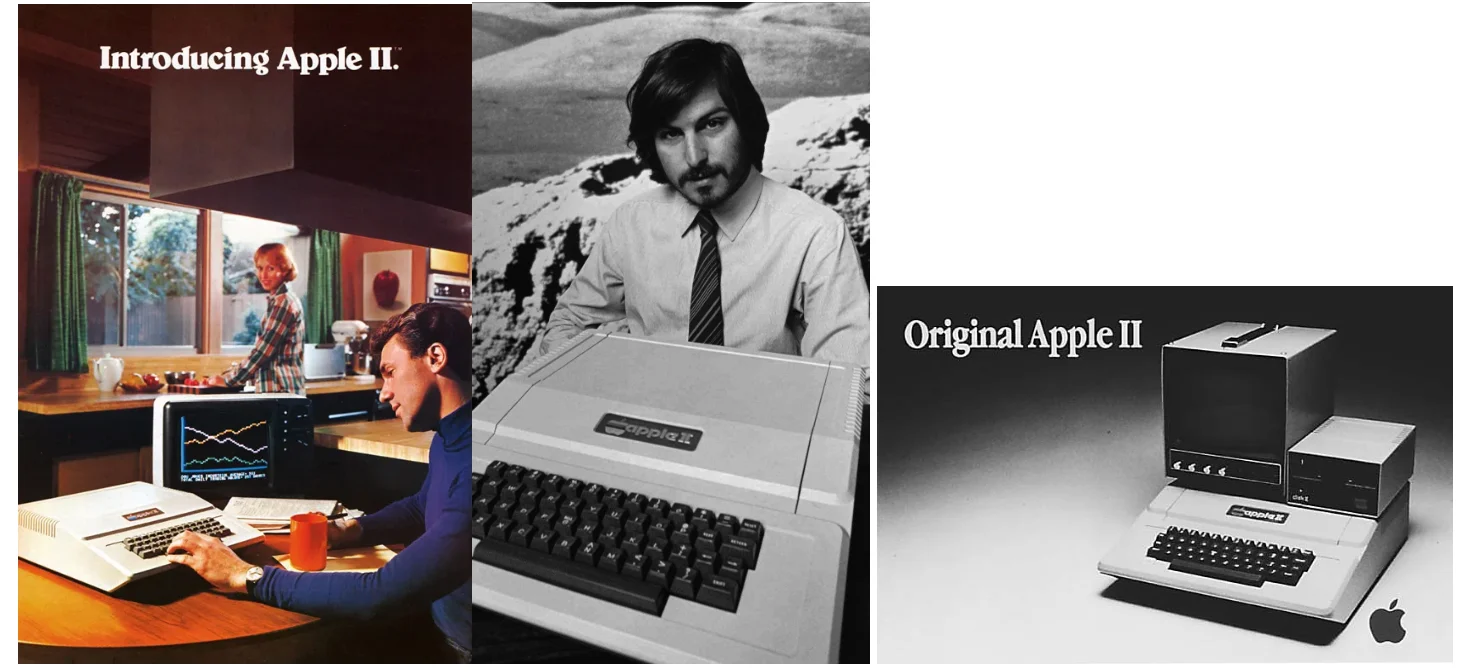
In 1976, Steve Wozniak and Steve Jobs began selling the Apple I computer as a kit in computer stores. Later that year, Wozniak designed an improved version, the Apple II, which was demonstrated by the pair in December. The Apple II was introduced to the public in April 1977, starting the boom in personal computer sales and putting Apple in the lead among PC makers.
The Apple II included 4 KB RAM and graphics capabilities, with external storage originally on cassette tape, but later through an external floppy disk drive. By the time the Macintosh appeared in 1984, over 2 million Apple II computers had been sold.
It cost $1,298 USD in 1977, which would be $6,465 in today’s equivalent.
January 1984 - Macintosh computer
“The computer for the rest of us”
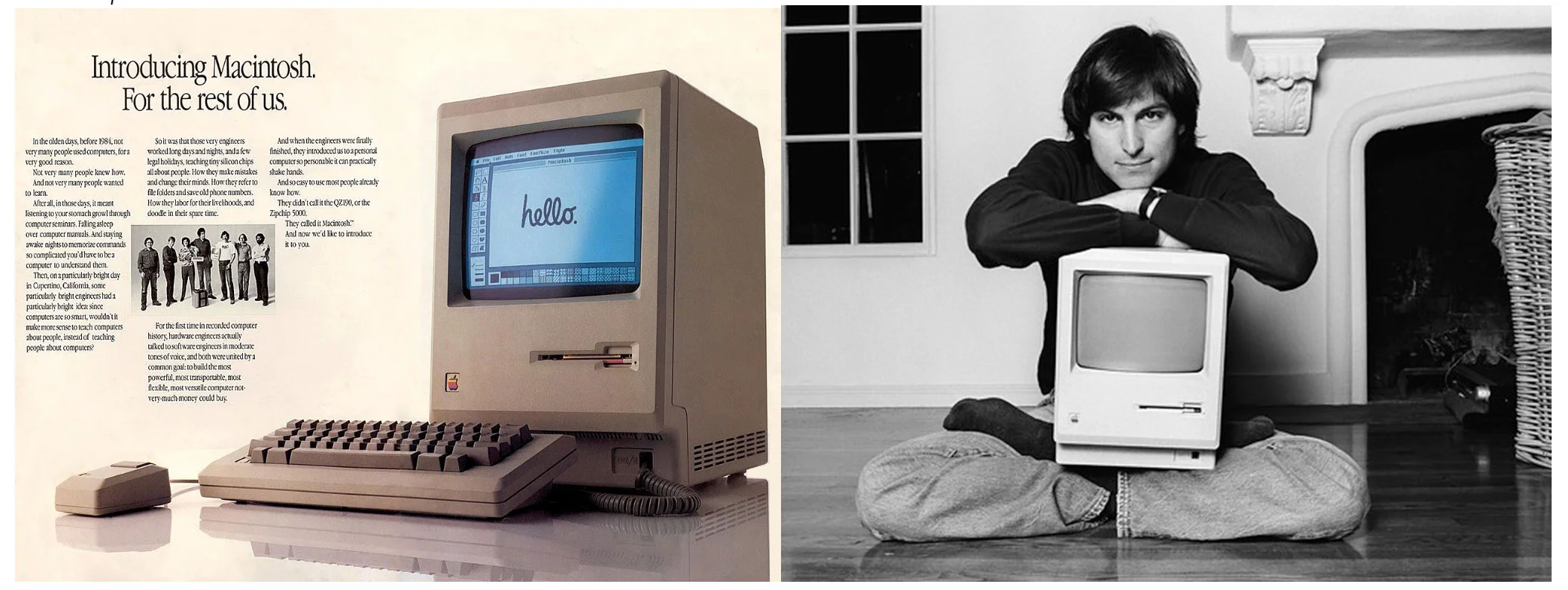
Almost 40 years ago, in 1984, Apple truly got the world’s attention when it debuted the Macintosh at an event in Cupertino, California, shortly after a Super Bowl ad directed by Ridley Scott. It was the first computer to use a graphical user interface with icons instead of only having a command line (text-based input/output only), which influenced the personal computing industry and inspired more intuitive software - many of the key concepts still used today were introduced with this product!
The original Macintosh was introduced by Steve Jobs at a press conference, also introducing what much later become known as macOS to users for the first time.
It attracted strong sales and put Apple in the lead at this time for personal computers.
The first Macintosh was sold at $ 2,495, which translates to $7,248 in today’s value!
(Keep that in mind when you see the price of whatever Apple launches next)
- Watch Steve Jobs reveal the Macintosh
- Watch the famous “1984” ad that announced the Macintosh, directed by Ridley Scott
August 1998 - iMac
 In 1998, Steve Jobs brought new life to Apple with the first iMac, featuring a striking, colorful, and translucent design that set it apart from other computers in the market.
In 1998, Steve Jobs brought new life to Apple with the first iMac, featuring a striking, colorful, and translucent design that set it apart from other computers in the market.
Apple made a risky decision to exclude the floppy disk drive, anticipating the shift towards CDs and internet downloads, and they were right. The 1998 iMac introduction event remains very memorable (find it below), with the 2021 M1 iMac introduction reminding many of this original introduction.
This innovative, internet-equipped product (which it was one of the very first products to feature at the time) was a major factor in saving the at the time almost-bankrupt Apple.
The first iMac retailed at $1,299 which would be $2,405 in today’s value.
October 2001 - iPod

Launched in 2001, the iPod was not the first mp3 player but it very quickly became the most popular digital music player, driving Apple’s renaissance. It was called a “halo” product since it made people buy other Apple products after experiencing the ease-of-use of the iPod. It changed the way we purchase music and spawned some extremely iconic ads.
- Watch the iPod launch event
- First iPod ad
- Initial press release:
January 2007 - iPhone
”iPhone is a revolutionary and magical product that is literally five years ahead of any other mobile phone. We are all born with the ultimate pointing device—our fingers—and iPhone uses them to create the most revolutionary user interface since the mouse.” – Steve Jobs
Where to even start with this one. Let me say this: if you have never taken the time to watch the iPhone launch keynote – I cannot recommend it enough. It remains as awe-inspiring and entertaining today as it was at the time.
Steve Jobs first showed off the original iPhone during a keynote presentation at the 2007 Macworld Expo in San Francisco. He said Apple would “reinvent the phone.” He was right.
Tthe iPhone made smartphones into household, can’t-live-without items. It created the world of apps. It changed how we live, work and get entertained.
During the keynote, Steve communicated a that Apple set a goal for itself to reach one percent of the mobile phone market share. At the time, the rest of the world was very skeptical - it was said that Apple had no experience selling phones (“The PC guys aren’t just going to walk in here”), plus that people didn’t need a smartphone, or those that did could never use one without a physical keyboard.
Apple did meet its goal, selling more than 13 million iPhones the following year after the announcement, putting it well above one percent market share at the time.
Today, Apple sells more than 250 million iPhones every year.
- Watch on Apple Events - jump to the 00:26:00 (26 minutes) mark for when the iPhone introduction starts
- First iPhone ad
- Check out the initial press release announcing the iPhone:
April 2010 - iPad
“iPad is our most advanced technology in a magical and revolutionary device at an unbelievable price. iPad creates and defines an entirely new category of devices that will connect users with their apps and content in a much more intimate, intuitive and fun way than ever before.” – Steve Jobs
Apple announced the first iPad in 2010, which in essence created the entire tablet market and also led to thinner laptops from Apple and other manufacturers. Steve Jobs revealed that Apple actually started working on the iPad before the iPhone. Unfortunately, the introduction of the iPad 2 a year later turned out to be Steve Jobs last keynote; he passed away a day after the iPhone 4s was introduced on October 5th, 2011.
It was a revolutionary tablet, an essential product. Steve Jobs said he became depressed when people called the iPad an oversized iPod touch and a failure. Steve believed this product would change the world. History has proven him right – the iPad product line passed 500 million sales in 2021, and Apple today sell approximately 40-50 million new iPads every year.
A fun detail was that before the iPad was officially revealed, it was widely reported in the media to cost from $999 – which turned out to be very wrong as it’s starting price was $499 ($700 USD in today’s value) which took the industry by surprise (see the gif above and if you watch the event, you can hear the audience reaction)
- Watch on Apple Events - start from the beginning
- First iPad ads: here & here
- Check out the official iPad press release:
September 2014 - Apple Watch
“Apple introduced the world to several category-defining products, the Mac, iPod, iPhone and iPad. And once again Apple is poised to captivate the world with a revolutionary product that can enrich people’s lives. It’s the most personal product we’ve ever made.” – Tim Cook
“With Apple Watch, we’ve developed multiple technologies and an entirely new user interface specifically for a device that’s designed to be worn. It blurs the boundary between physical object and user interface. We’ve created an entire range of products that enable unparalleled personalization.” - Jony Ive
This began Tim Cook’s era and the introduction of one of his most revolutionary products, the Apple Watch (AirPods being another one – if you would split out only the AirPods sales into a separate company, it would instantly become one of the world’s 300 largest companies by revenue) The Apple Watch, unveiled at an event in September 2014, was the first new product line released after Steve Jobs’ death. It went on sale in April 2015.
Apple become the #1 and most popular watch brand in 2015 and has remained so ever since – and that is not smartwatch brand, but watch brand. In 2020, Apple generated more revenue only from the Apple Watch than the entire Swiss watch industry combined.
Based on analysis by Counterpoint research, it is estimated that Apple sells 50 million Apple Watches per year and that Apple has 60% of the global smartwatch market revenue and about 35% of the overall market.
Every quarter Apple themselves reports that about 75% of Apple Watch buyers were first-time buyers of the device – meaning the product is still on a significant growth trajectory.
At this September 2014 keynote, we also got the introduction to the Apple Pay service, the first service announced under Tim Cook.
- Watch on Apple Events - start at the 00:55:00 mark (55 minutes in)
- Original press release:
Why to be extra excited about WWDC23
There are many reasons to be excited about the upcoming WWDC23 keynote - as mentioned a few times Apple is expected and rumoured to be announcing the first new product category introduction since 2014, which again is something Apple has only done five times before (Macintosh, iPod, iPhone, iPad, Apple Watch) in it’s long history. So just being part of that will be very cool, as most of us would have missed those previous introductions.
But another detail, is what Apple is doing before the keynote. Earlier this month, they’ve made two major announcements:
 Apple brings Final Cut Pro and Logic Pro to iPad
Apple brings Final Cut Pro and Logic Pro to iPad
Pro apps introduce powerful features designed for iPad to deliver the ultimate mobile studio for video and music creators
In any other year, including a good year with plenty to announce in WWDC, this annoucement for sure would be included in the WWDC keynote itself, taking up probably 10 minutes or so with demos and so on - not something that would be announced separately in advance. It’s very cool and big news. So what does it tell us the Apple does announce this in advance?
If you ask me, it’s 100% because it’s such a packed WWDC keynote that there just wasn’t any time for this! Which is very exciting :)
Apple didn’t stop there though:
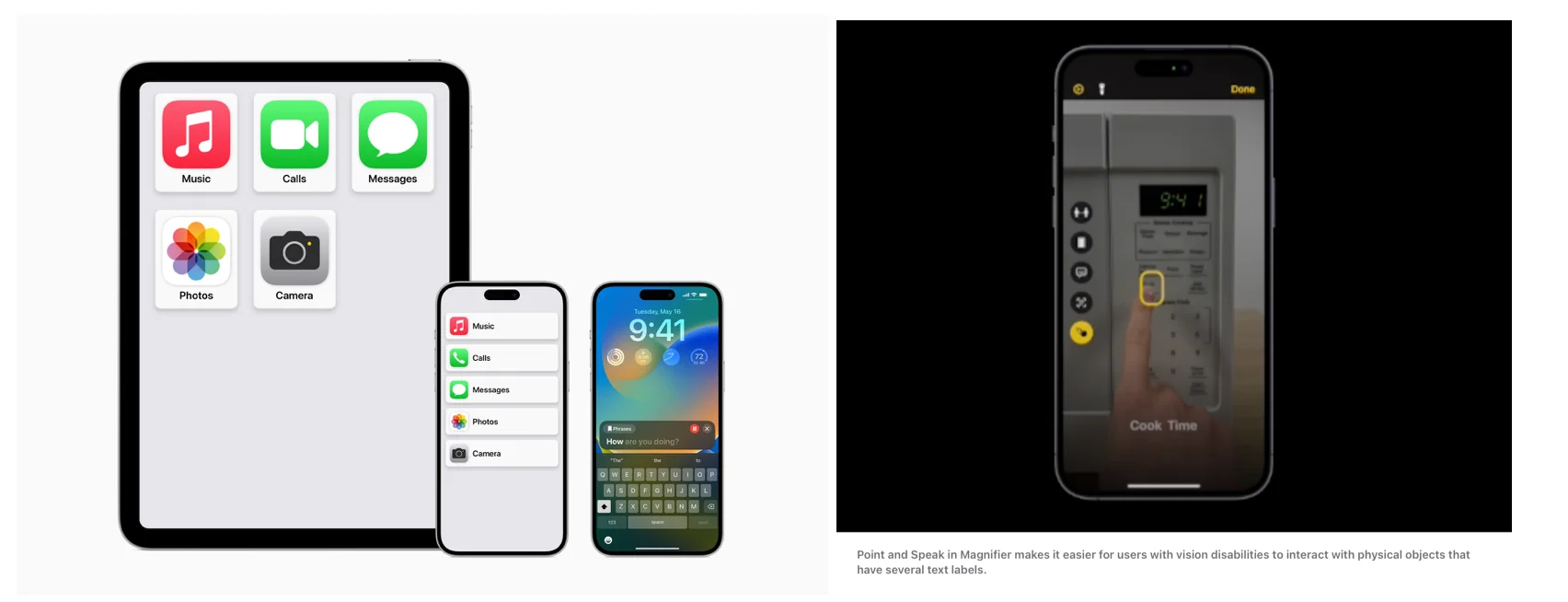 Apple introduces new features for cognitive accessibility, along with Live Speech, Personal Voice, and Point and Speak in Magnifier
Apple introduces new features for cognitive accessibility, along with Live Speech, Personal Voice, and Point and Speak in Magnifier
New software features for cognitive, speech, and vision accessibility are coming later this year
You don’t have to squint very much to see how many of these accessibility features also would make a ton of sense in a different context, such as the new product cateogry that Apple is rumoured to launch. :) But even without squinting, these are cool and major features that would have been featured in the keynote as well during a normal year.
Other smaller announcements Apple has made during May:
- Apple launches new concert discovery features on Apple Maps and Apple Music
- Apple launches 20 fun new games for its award-winning Apple Arcade service
WHAT THE CAR?, TMNT Splintered Fate, Disney SpellStruck, and Cityscapes: Sim Builder are available today, along with more than 200 games on Apple Arcade - Apple Music Live returns for a brand-new season of exclusive live concerts with a special performance by Ed Sheeran
The global superstar will perform his new album in full for the first time, streaming on Apple Music and Apple TV+ on May 10
OK I am convinced, how do I watch it then?
Add the keynote event to your calendar and then just visit apple.com just before the time and the stream will happen there. (It will also live stream on YouTube, on the TV app on Apple TV. If you do miss it live, you will be able to watch it after the fact on apple.com).
#
